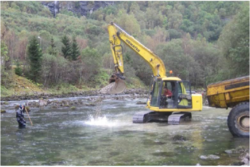Difference between revisions of "Operational measures (turbine operations, spillway passage)"
Jump to navigation
Jump to search
Bendikhansen (talk | contribs) (Created page with "category:Downstream fish migration measurescategory:Measures file:broken") |
Bendikhansen (talk | contribs) |
||
| Line 1: | Line 1: | ||
| − | [[category:Downstream fish migration measures]][[category:Measures]] | + | [[category:Downstream fish migration measures]][[category:Measures]][[Category:Needs improvement]] |
| − | [[file: | + | [[file:spawning_gravel_excavator.png|thumb|250px|Figure 1:]] |
| + | [[file:spawning_gravel_excavator.png|thumb|250px|Figure 2:]] | ||
| + | [[file:spawning_gravel_excavator.png|thumb|250px|Figure 3:]] | ||
| + | |||
| + | =Introduction= | ||
| + | Turbine operations: | ||
| + | Without modification of the water intake, the shutdown of conventional turbines is the only solution to avoid turbine passage and the corresponding fish mortality rates. This solution can in principle be effective, but can become very costly for the hydroelectric operator if the shutdowns are not targeted. The challenge is not only to target, but also to anticipate the events of downstream migration. | ||
| + | |||
| + | =[[Methods, tools, and devices]]= | ||
| + | |||
| + | ==During planning== | ||
| + | |||
| + | ==During implementation== | ||
| + | |||
| + | |||
| + | ==During operation== | ||
| + | |||
| + | =Classification table= | ||
Revision as of 10:56, 24 October 2019
Contents
Introduction
Turbine operations: Without modification of the water intake, the shutdown of conventional turbines is the only solution to avoid turbine passage and the corresponding fish mortality rates. This solution can in principle be effective, but can become very costly for the hydroelectric operator if the shutdowns are not targeted. The challenge is not only to target, but also to anticipate the events of downstream migration.
